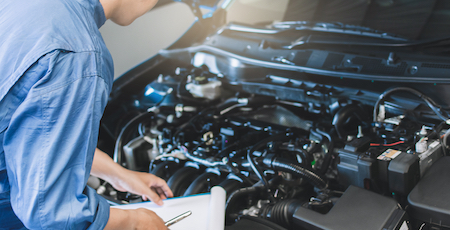There are many reasons a used car is the perfect vehicle to suit your needs.
- Maybe you’re finding a first car for your son or daughter.
- Maybe you want a reliable second car for odd jobs you have around the house.
- Maybe you’re looking for reliable transportation without the high cost of a new car.
Over 43 million used cars were sold in the US in 2021. Whether you buy it from a dealer, a used car lot, or a private seller in your own community, it’s good to get to know your used car before you rely on it to get you where you’re going.
It’s easy to assume that the previous owner cared for the car well. But in truth, you can never be sure they handled maintenance issues the way you would.
To give your new-to-you vehicle the best chance at a long life, why not give it a little car maintenance?

Car maintenance after buying a new car is the perfect way to ensure everything works well and is in the best shape possible.
Where do you begin?
Start with your owner’s manual
Most drivers spend little time with their vehicle’s owner’s manual. That’s a mistake.
Not all cars are the same. They are created using different parts and systems, each requiring different levels of maintenance. By opening up your owner’s manual, you can start learning how the designers built your car, and what recommendations they make for regular maintenance. Manufacturers know best.
As you scan the manual, start making a list of areas you wish to check out. You can use your car’s mileage as a guide for follow-up on parts and systems. Here’s a list of potential maintenance items you may wish to consider:
- Motor oil and oil filter replacement
- Check and top off all fluids inside the vehicle
- Replace spark plugs
- Replace coolant
- Check brake fluid
- Rotate and balance tires
- Check the tire pressure regularly, especially before long trips
- Ensure the spare tire is in good shape
This is your starting point. If you have any other questions after reading your manual, be sure to bring them up with a mechanic on your next scheduled visit.
Get those fluids changed
Now that you know your vehicle a little better, your first step should be to replace as many serviceable fluids as possible. Because you don’t know how well the previous driver treated the vehicle, it’s best to start out with a car that’s as well cared for and up to date as possible.
If the previous owner gave you a maintenance log with receipts for fluid changes, you may choose to skip this step. Otherwise, this is an important step for after-purchase maintenance for all secondhand vehicles.
We listed many of the standard fluids to change out above: motor oil, coolant or antifreeze, and possibly a brake fluid flush.
Depending on what you intend to do with the vehicle, you might choose to replace the transmission fluid, or change out the differential gear oil if you’ll be hauling heavy loads.
This is about creating a vehicle you can trust for many years to come.
Replace filters
For most drivers, replacing filters means starting with the oil filter. Most likely, the mechanic will suggest that when they change out the motor oil.
It’s also a good idea to replace the engine’s air filter. The air filter helps keep harmful contaminants from entering the engine, and ensures only clean air, without debris, reaches the engine’s main components. If this becomes clogged, it can set off a host of problems throughout your car.
There’s one more filter that many people forget or ignore: the cabin air filter. This affects the air supply that enters the passenger compartment. This air filter is usually underneath the dashboard, and helps filter out pollen, dust, and debris, so it doesn’t build up in your vehicle’s heating and cooling system. A new air filter will give you cleaner air to breathe and better performance too.
Don’t forget to check the tires
There’s nothing a little elbow grease can’t hide. If the previous owner cleaned the tires well enough, you may overlook key problem areas that suggest your tires need replacing. Because a blow-out can impact your safety, it’s a good idea to have them thoroughly inspected before you start driving.
Where do you start? Check the tread wear; it’s easy to do. Most tires start with a tire tread of around 10/32”. The soft rubber starts to wear away as you add mileage to the vehicle. This is what gives your tires traction in all kinds of handling situations. Most states regulate tires unsafe to drive when they reach 2/32”, but is that really safe?
While a mechanic will use a gauge to check tread depth, you can do a simple test yourself. Take a penny and slip it into the tire tread as a depth gauge. If you can see the top of Lincoln’s head, it’s time to replace your tires. The top of Lincoln’s head to the penny edge is roughly 2/32”.
You should also check sidewalls for cracks. If something appears to stand out, it’s better to get it inspected before heading out on the open road. Getting the wheels balanced and aligned will also ensure even wear on your tires in the coming weeks.
Finding a mechanic you can trust
Mechanics are a lot like doctors; if you can find one you can trust, you’ll be assured your car is in good condition throughout the year.
If you didn’t get an inspection before you finalized your used car purchase, it’s not too late now that you own it. In fact, it’s the perfect time to ensure it’s in great condition, so that it will be reliable and provide you with safety and security for as long as you drive the car.
Have a question about your new-to-you used car? We can help.
